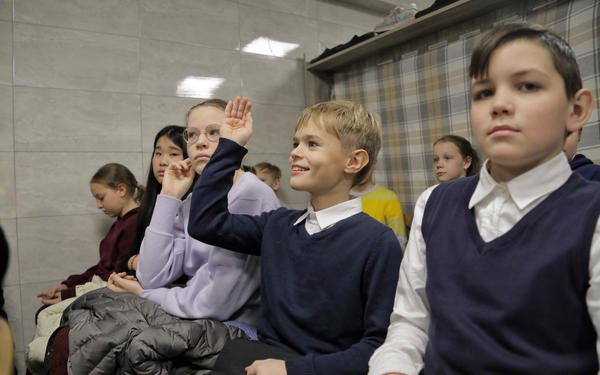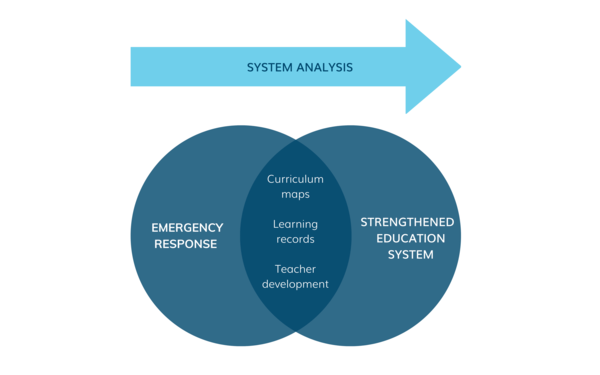Ukraine: An emergency response with a long-term vision
One year on from Russia’s full-scale invasion of Ukraine, we must recommit to prioritising children’s education now and for the future.

UNICEF is calling for increased support to ensure learning for children in Ukraine and in host education systems. At the Education Cannot Wait Financing Summit last week, the international community invested $826m in supporting children’s education in emergencies. Ukraine’s Ministry of Education & Science, teachers and students persist in intensely challenging circumstances.
I recently sat down with Oksana Matiiash, CEO of Teach for Ukraine. She shared how important it is to build a strong education system Ukrainian children want to go back to after the war.
We must also approach education in a trauma-sensitive way.
- The war in Ukraine has disrupted more than five million children’s education. (UNICEF)
- An estimated 2 out of 3 Ukrainian refugee children are not currently enrolled in host country education systems. (UNICEF)
Bridging the gap between emergency response and long-term development
These challenges are not mutually exclusive. Often, emergencies call for immediate action, leaving long-term development as a post-crisis focus. However, for coherent action and most efficient use of resource, the two must be tackled together.
A year ago, at Cambridge we drew on our experience of evidence-based education system-strengthening to develop a model that bridges the divide between short-term emergency responses and long-term development.
In May 2022, we met with the Ministry of Education & Science of Ukraine to see how this model might align to their needs and plans. In August, we signed an agreement to start work together.
“The emerging situation in the education system of Ukraine reveals the importance of flexible policy approaches, preparedness for uncertainty, the role of strategic vision, as well as evidence-based actions. This project is the benchmark for designing further education initiatives in the country… The Ministry of Education strongly supports implementation of the project which removes the hurdles felt by Ukrainians displaced all around the world.” Minister of Education & Science of Ukraine, Serhiy Shkarlet
Building blocks for a sustainable future
The model has several phases:
- Developing learning maps of host countries, where we compare the curriculum of a country hosting refugees to the curriculum of Ukraine to support temporary integration of Ukrainian students into other systems, and smoother reintegration to a Ukrainian system after the war is won.
- Developing digital learning records for every Ukrainian student.
- Providing teacher development opportunities for teachers in both Ukraine and host nations offering: tools to help children catch up on missed learning; teacher wellbeing support; connection to the future vision for New Ukrainian Schools.

These phases work best together. Along with the Ministry of Education & Science, we aim to use system analysis and the future vision for New Ukrainian Schools to help ensure successful reintegration, future resilience and world-class reconstructed national education.
For example, we can use learning maps and records to understand the needs of returning students. This includes creating teacher guides so they can quickly access relevant information to support the children in front of them, and in-depth reports to the Ministry.
"What is most important is human capital…We need to build the education system for parents and children…to have the motivation to come back… We will need collective leadership for that, we won’t be able to rebuild the education just ourselves.” Oksana Matiiash, CEO, Teach for Ukraine
Children’s experiences during this war are all different. You may be going to school in your hometown but have classes continually interrupted by air raids. You may be studying online in a temporary shelter. You may have joined a school in a different country. Our model helps teachers and leaders support every child and develop an education system that nurtures the essential human capital for rebuilding a nation.
"Ukrainian children all over the world are losing their right to an education. My message to funders is to please help my country develop a modern education system that our children, and their parents, will want to return to.” Liubov Bilych, Teaching Assistant at a UK Primary School & Ukrainian refugee
A blueprint for further action
Now is the time to act to support Ukraine. In doing so, we can create a blueprint for addressing crises worldwide moving forward. Unthinkable disasters have struck nations and individuals in the past year, and horrific circumstances continue to escalate for the people of Türkiye and Syria.
Together, we can shift from short-term thinking to a long-term, sustainable mindset. We can reduce duplication of effort and resources.
Partnership
It is a privilege to collaborate with partners who remain positive and resilient in the face of immense challenges, including the Ministry of Education & Science and the Ukraine Education Cluster.
We are in discussions about how to continue supporting Ukraine with a wider network – from those within our own university to the Education Cluster; a group of UN agencies, NGOs and government agencies working on access to safe, equitable and quality education and strengthening the capacity of the education system and communities.
We have developed our first learning maps and transition guides and are exploring opportunities for partnerships, which will be essential to implement the model. We have a chance to do things differently here, together, to impact millions of children.
Today, as every day, we stand with Ukraine.
If you want to know more about our work and ways to partner, contact Dr Anna Kingsley, Head of Partnerships: [email protected]



